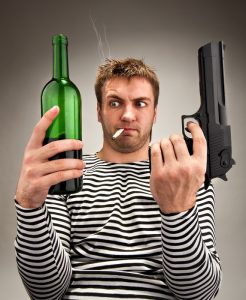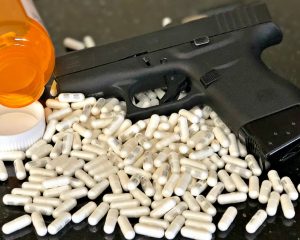Most people would be highly aware of the fact that drinking and driving don’t mix. It’s just not something that should ever be done. The same can certainly be said for the handling and shooting of firearms while under the influence. If you consider the potential for injury, keeping your head clear at all times is the only way to go.
It would be hard to attribute the exact number of accidental or unintentional discharge incidents over the course of a year to shooters being impaired, as the categories for this type of thing tend to be fairly broad. Needless to say, they do exist and they would certainly include any number of near-misses or reckless behavior that might not have necessarily resulted in injury.
As any responsible gun owner knows, the rules around gun safety are very well-established and must be strictly followed in order to avoid the possibility of any kind of mishap. Whether handling, loading, cleaning or shooting, you
 need to have your senses sharp and your wits about you. Even completely sober, accidents can still happen, so why temp fate by doing any of this while impaired? Driving while intoxicated gets a lot of press (and for good reason) given the number of accidents caused annually, but the principles remain the same when undertaking any kind of activity that involves risk. The general sentiment being something like ‘I’m fine – it was just a few drinks – I can handle it’ tends to override better judgement, which can lead to bad decisions being made.
need to have your senses sharp and your wits about you. Even completely sober, accidents can still happen, so why temp fate by doing any of this while impaired? Driving while intoxicated gets a lot of press (and for good reason) given the number of accidents caused annually, but the principles remain the same when undertaking any kind of activity that involves risk. The general sentiment being something like ‘I’m fine – it was just a few drinks – I can handle it’ tends to override better judgement, which can lead to bad decisions being made.
When it comes to handling firearms, having a zero-tolerance policy for the consumption of potential inebriants is really the only reasonable option. Even if the participant isn’t fall-down drunk, there is enough of a range for intoxication that it can absolutely affect balance, performance and thought processes. Consider alcohol, recreational and illegal drugs, prescription and over-the-counter medications and even fatigue as all having the potential to interact poorly, or in and of themselves, have a highly negative effect on how you operate.
Risks & Effects on Performance
Clearly, there are many potential variables and a number of different ways that substance-related impairment can affect individuals. They may include, but are not limited to:
Poor Judgment & Decision-Making
One of the fundamental issues with being impaired, is that it affects your ability to determine if you are actually impaired in the first place. This could result in picking up a firearm when you really shouldn’t have, or other unsafe behaviors while handling, such as pointing the gun in an unsafe direction or not properly identifying a target or what may be beyond it.
Emotional Instability
Aside from compromising your judgment, the consumption of drugs, and especially alcohol, can also lead to erratic behavior, aggression, irritability, depression and loss of impulse control. This potentially heightened emotional state can tend to either create or amplify situational conflict which is never a good case if you’re holding a gun.
Decreased Awareness & Safety Protocols
Even when someone is fully sober and alert, firearm accidents often occur due to unintentional discharges and/or a lack of attention being paid to safety standards. Obviously if your brain isn’t firing on all cylinders due to some form of impairment, the risks will rise exponentially. Add-in an overall drop in basic motor skills, and you’ve got a recipe for disaster. Impaired individuals also may not fully comprehend the seriousness of their actions or the potential consequences of handling a loaded weapon or pulling the trigger.
for disaster. Impaired individuals also may not fully comprehend the seriousness of their actions or the potential consequences of handling a loaded weapon or pulling the trigger.
Safety fundamentals such as keeping the muzzle in a safe direction, keeping your finger off the trigger, knowing your target and what’s beyond it and always treating your firearm as if it were loaded can all easily go out the window. Remember to check and clear the chamber? Secure your gun properly when transporting? Avoid sweeping your muzzle across your group of hunting buddies? It’s a lot harder if you’re half in the bag.
Negative Physical Symptoms
Everyone may react a little differently, but here’s a rundown of the common physical reactions to intoxication that typically affect shooters.
- Mental alertness slows
- Vision may be blurred
- Depth perception can be altered
- Motor skills & co-ordination are typically compromised
- Balance is affected
- Drowsiness
- Delayed or slower reaction time
Note that we’re not referencing any specific cause-&-effect with intoxication vs. shooting skills in the above list because frankly, folks just shouldn’t be doing it.
Handling firearms in any way while impaired is not only reckless, but it can have potentially tragic consequences. Firearms always demand complete respect, with a responsible approach and a clear state of mind.
Sign up for K-Var’s weekly newsletter and discounts here.

Leave a Reply